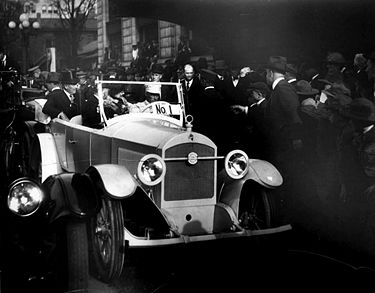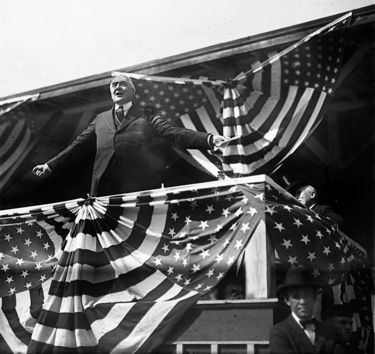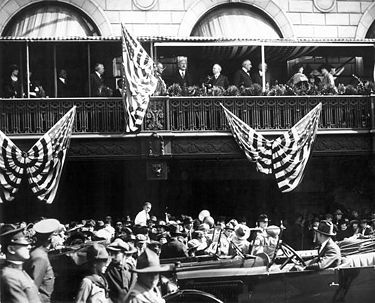1921 Presidential visit
The 1921 Presidential visit to Birmingham was made by Warren G. Harding on October 26, 1921 on the occasion of the city's semicentennial. Harding's speech in Capitol Park was notable because it was the first speech delivered by a sitting president in the South which called for political equality for African Americans.
The Birmingham Age-Herald facilitated the President's visit by buying the front page of the Marion, Ohio Daily Star, of which Harding was the publisher.
The week's festivities were largely planned around the President's day-long visit to the city. Red, white and blue bunting covered downtown streets along with banners bearing his portrait on every corner. Officials estimated that over 100,000 people lined the streets during the grand parade and filled the park for the President's speech.
Arrival

President Harding arrived at 8:45 AM on an unseasonably-warm Wednesday at the Birmingham Terminal Station, aboard a special train from Washington via Charlottesville, Virginia and Atlanta, Georgia. Traveling with the President was First Lady Florence King Harding, Secretary of War John W. Weeks, Secretary of Interior Albert B. Fall, Senator and Mrs Oscar Underwood and various military figures, journalists and Secret Service agents.
His arrival was marked by a 21-gun salute fired by members of the Alabama National Guard. The rifle shots served as a signal for every industrial plant in the city to sound their whistles. The party was greeted by Alabama's 67 "County Queens", to whom Harding delivered a short greeting, before processing down 5th Avenue North to the Tutwiler Hotel in view of thousands of onlookers waving American flags.
A grand parade began at 10:00 AM and looped around the entire business district. The lead car, in which Harding was joined by his First Lady, former Mayor George Ward and Frank McQueen, a black barber, was a gleaming white Premocar, manufactured in Birmingham by the Preston Motors Corporation. All along the route he was showered with thrown flowers. The parade culminated below the Tutwiler's balcony which served as the President's reviewing stand after he disembarked. He watched the rest of the procession, which included Civil War veterans, veterans of the Rainbow Division, National Guardsmen, groups of industrial workers, and the "Pioneers of 1871", representatives of people living in the city when it was founded.
The President and members of his party expressed that Birmingham had given the President the greatest, warmest, and most enthusiastic reception of his term in office.
Speech
Harding's address to the city was delivered in Capitol Park at 11:30 AM to what was reportedly the largest crowd ever assembled in the fast-growing city. He was welcomed formally to Alabama by Governor Thomas Kilby and to Birmingham by Mayor Nathaniel Barrett. Sydney J. Bowie introduced the President to the podium.
He noted the "marvelous achievement" of 50 years of unsurpassed industrial development in a region still mired in the effects of Reconstruction. He expressed hope that when someday the history of the post-Civil War South was written, that the world would realize how it met a great crisis with one of "the greatest demonstrations in all history of the possibilities of adaptation, organization and industrial development under stress of great necessity."
Harding used the speech to make his first public show of support for the Republican National Committee's plans to reorganize the party in the South. He explained that race was becoming a national issue and could no longer remain a solely regional concern. He talked of the great migrations of black laborers to the North during World War I, and the meritorious service given by black soldiers during the war, and then went on to speak for political equality as a guarantee of the U. S. Constitution: "Let the black man vote when he is fit to vote; prohibit the white man voting when he is unfit to vote."
White listeners fell largely silent while African-Americans cheered from their segregated section of the park. Noting the rather cool reaction, Harding stood his ground and pointed directly into the white section, and instructed them, "whether you like it or not, unless our democracy is a lie, you must stand for that equality."
Harding qualified his remarks by noting that he did not intend "social equality" for blacks and whites, saying that "racial amalgamation can never come in America."
Reactions
Reaction in the next day's press was also mixed. The Birmingham News described the speech itself as "courageous", but worried openly that black listeners would misinterpret Harding's statements. Meanwhile, the Birmingham Post panned Harding's speech as a tactless violation, an "untimely and ill-considered intrusion into a question of which he evidently knows little".
The New York Times printed responses from Democratic and Republican leaders to the landmark speech. Democratic Senators based their criticisms on a belief that "the problem of dealing with the negro" should be a "local affair", and that the President's speech would only complicate progress on that front. Senator Pat Harrison of Mississippi warned that "if the President's theory is carried to its ultimate conclusion, ... then that means that the black man can strive to become President of the United States, ... It means white women should work under black men in public places, as well as in all trades and professions." Senator Thomas E. Watson of Georgia lambasted Harding for planting "fatal germs in the minds of the black race." Senator J. Thomas Heflin of Alabama asserted that "So far as the South is concerned, we hold to the doctrine that God Almighty has fixed the limits and boundaries between the two races and no Republican living can improve upon His handicap work."
On the other side of the aisle, Senator Selden Spencer of Missouri applauded the speech, saying that "The President ... uttered in the language of the statesmen what every man who believed in the Constitution of the United States accepts wholeheartedly ... To criticise the support of this Constitutional provision is nothing less than anarchy." Senator Frank Willis of Harding's native Ohio said "The country will applaud President Harding's clearness of statement and patriotism of purpose."
Marcus Garvey, president of the Universal Negro Improvement Association, telegraphed Harding at the hotel to congratulate him on his speech, "on behalf of four hundred million negroes of the world" and elaborating that "All true negroes are against social equality, believing that all races should develop on their own social lines. Only a few selfish members of the negro race believe in the social amalgamation of black and white."
In a December 1921 column in The Crisis, the outlet he founded for the NAACP, African-American scholar W. E. B. Dubois likened Harding's "Birmingham Speech" to "a sudden thunder in blue skies," that drove all who had discussed "the Negro Problem" out of the shadows and "into the clear light of truth."
In analyzing the distinction that the President made between political equality and social equality, DuBois concluded that Harding must have been speaking only of a narrow definition for the latter, in which a group could assume the right to demand social companionship, rather than a broader sense in which any group could expect to be eligible for such companionship.
Banquet
After delivering his speech, Harding also made remarks at a luncheon in his honor at the Tutwiler, introduced by Senator Underwood. The chefs of the Hotel prepared a special menu of Southern foods prepared and served in the French style. The serving began with a "Canape Semi-Centennial" with Queen olives and Marion celery. The soup was "Alabama Gumbo Creole en Tasse", followed by the main course, "Fried Chicken, a la Warren G. Harding", which was served with "Sweet Potatoes, Kilby" and "Sunny South Lye Hominy" and "Corn Fritters, Jefferson". Accompanying the meal were "Magic City Biscuits" and "Salad a la Ramsay". The meal was finished with assorted cakes ("Tortoni American") and coffee. Tickets to attend the luncheon were sold out days in advance.
Remainder of visit
At 2:30 PM he attended the inauguration of Guy Snavely as President of Birmingham-Southern College at First Methodist Church and received an honorary Doctor of Laws, as well as a "Key to the College" presented by board chair Robert Munger.
Harding then laid the cornerstone of the Masonic Temple at 20th Street and 5th Avenue North and viewed the Fashion-Industrial Exposition on West 20th Street and a demonstration mine rescue at the Mines Station in West End. Meanwhile, Mrs Harding was honored with a reception at the Birmingham Country Club.
After joining his wife at the Country Club and making a short farewell speech, the President was given an automobile tour of the city. His final public appearance took place at 8:00 PM at the Pageant of Birmingham in Avondale Park.
The President's special train departed at midnight for Camp Benning, Georgia and thence to Atlanta and back to Washington D. C.
Additional activities
During President Harding's visit, the first 6,000 Alabama Centennial half dollars, minted to commemorate the state's centennial, were sold from specially-built booths constructed just off the city's sidewalks.
See also
References
- Holmes, George R. (October 25, 1921). "Crowds Pouring In As Birthday Party Reaches Its Stride." The Birmingham News
- "Harding Supports New Policy in South" (October 27, 1921). New York Times
- "Praise and Assail Harding Negro Talk" (October 27, 1921). New York Times.
- "Harding Says Negro Must Have Equality in Political Life" (October 27, 1921) New York Times. - contains full text of speeches at Capitol Park and Tutwiler Hotel luncheon
- DuBois, W. E. B. (December 1921) "President Harding and Social Equality" The Crisis. Vol. 23, No. 2, pp. 53-56
- Harris, Carl V. (1977) Political Power in Birmingham: 1871-1921. Twentieth-Century America Series. Knoxville: University of Tennessee Press. ISBN 087049211X, p. 34
- Bates, Kelsey Scouten (February 2008) "Birmingham's chefs offer an inspired menu for President Harding's visit in 1921." Birmingham Magazine. Vol. 48, No. 2, pp. 214-5
External links
- "Address of the President of the United States at the celebration of the semicentennial of the founding of the city of Birmingham, Alabama, October 26, 1921" (1921) Washington D.C.: Government Printing Office, via the Library of Congress

